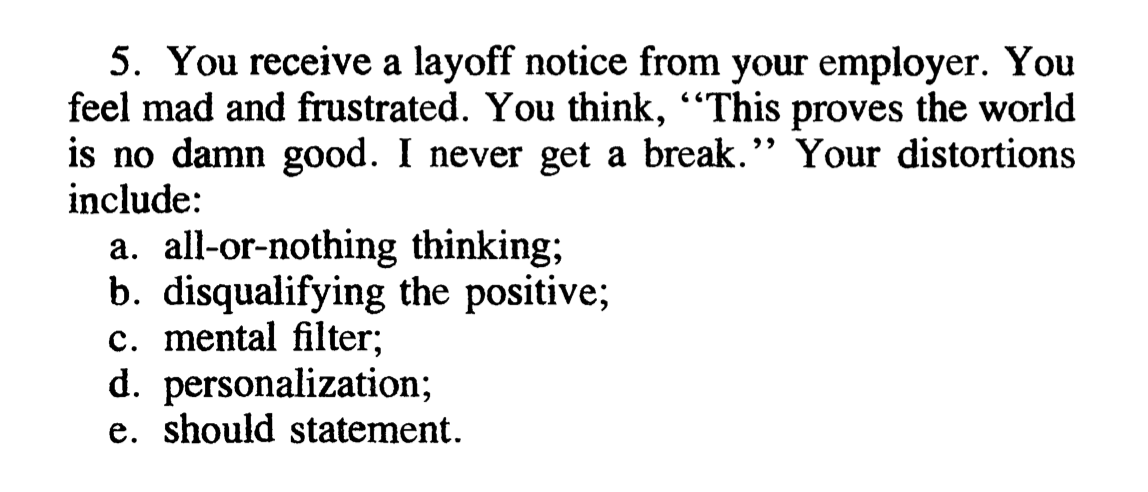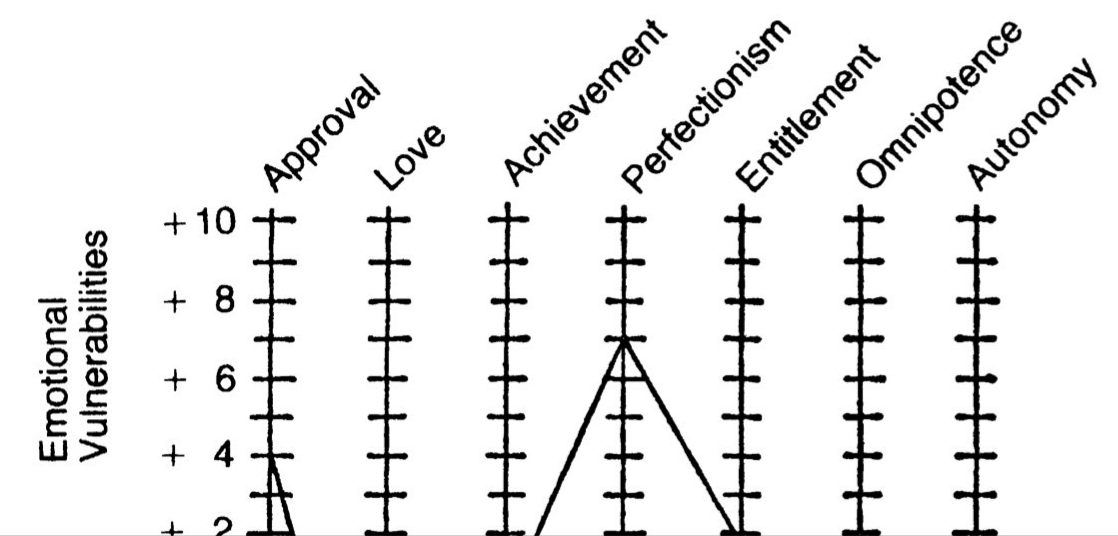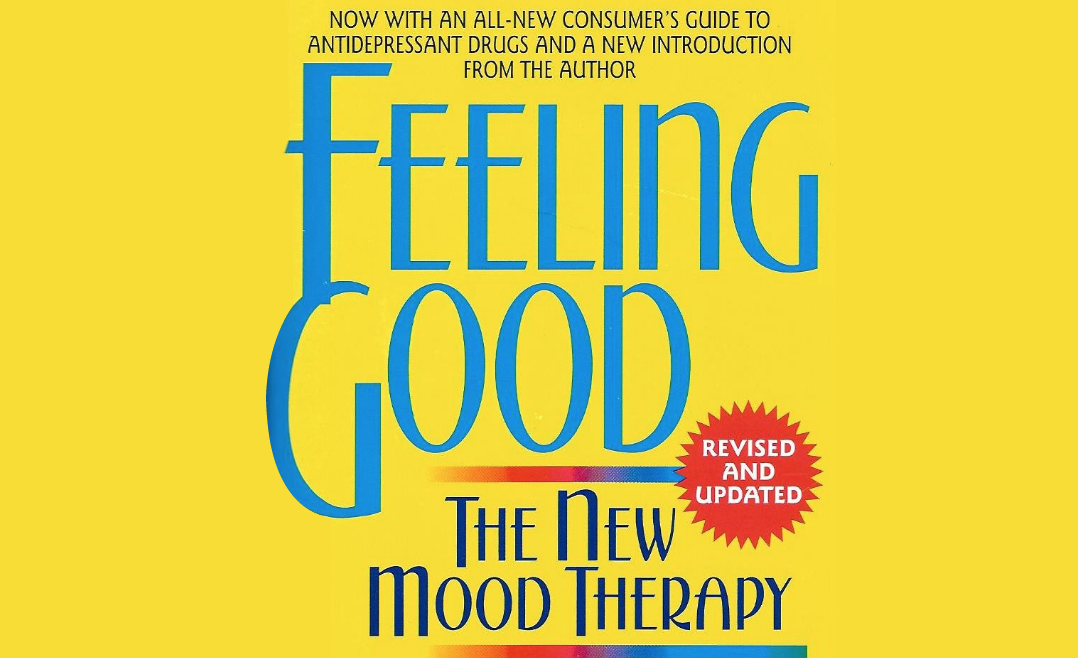I've been struggling with anxiety for a long, long time. I've mostly dealt with it by trying to channel it into my work – but I thought it was about high time I did more formal, evidence-backed therapy techniques.
Buuuuut I can't afford a therapist, so this book had to do.
This is one of those life-changing books with an unfortunately crappy title, and pigeonholed in the even crappier genre of "self help". But change my life this book did.
 my god even the book cover is crappy
my god even the book cover is crappy
Feeling Good: The New Mood Therapy was the 1980 book that popularized Cognitive Behavioral Therapy: the now gold standard in psychotherapy, empirically proven to be as good as drugs (or better) for many mental health issues, including depression, anxiety, phobias, PTSD, eating disorders, and lots more. (sidenote: Here's a meta-meta-analysis of CBT studies. tl;dr – the evidence is hella strong) This book was written by David Burns, an early student of Aaron T. Beck, the "father" of CBT.
Here's the first thing I learnt: CBT is less of a therapy, and more of a toolbox. It's a set of tools to find and fix the glitches in your thinking, and program better mindsets for yourself. The therapist can't fix your mind for you, only you can – all the therapist can do is give you the tools. (sidenote: For an even more extended use of the CBT-as-programming metaphor, check out CBT Is For Hackers.)
I won't spoil too much of this 700(!) page book for you, but here's the four thought-tools that I found most helpful, and that I still use regularly, three months after reading this book:
The Burns Depression Checklist

This one's a quick-and-dirty diagnostic tool, not really one that helps you find or fix your cognitive glitches. It's a 25-question survey to see how depressed you are.
The important thing is that this is not meant to be a one-time diagnosis. It's something you should quickly check in with every week – it only takes a minute – record your score, and see how you've been progressing over time. It's an ongoing metric.
I haven't done an in-person therapist session in a long time – the last time I did, it was because my mother wanted a child psychologist to convince me I wasn't actually queer – so I never actually got formally diagnosed. But the first time I took this short survey, I scored a 12 out of 100: "mild depression".
That actually really surprised me, and honestly, I first wrote it off as me unconsciously exaggerating my answers.
But over the next few weeks, as I learnt and applied the other tools found in this book, I could see my depression drop slowly and steadily, which gave me a lot of confidence! I just tested myself again as I'm writing this post, and scored a 6 out of 100: "normal but unhappy". Not perfect, but it's progress!
Anyway, speaking of those other tools...
A List of Mental Glitches

Or, "cognitive distortions", as David Burns puts it. Just like programmers have phrases for common bugs like off-by-one error or race condition, the author's compiled a Top Ten List of most common mental glitches, including all-or-nothing thinking and jumping to conclusions. (here's David's full list)
What I appreciate most about this book, is that it doesn't just give you a list – it gives you exercises to try out the tools you just learnt. As seen above, David lets you practice trying to find the glitches in different hypothetical scenarios.
And once you get the hang of finding mental glitches in other people's train of thought, David moves on to the next tool...
Talking Back To Yourself

...to find the glitches in your own train of thought.
David Burns calls this the "rational response" exercise. Whenever you feel sad or anxious, write down the automatic thought(s) you had that caused the pain, then next to it, try to find and counter the mental glitches behind each thought. (of course, if there are any – sometimes emotional pain is completely justified. But Burns makes a huge, huge distinction between healthy sadness, and the truly irrational, dysfunctional disorders.)
Over time, you'll be able to argue against your crappy automatic thoughts quicker and more effectively, to the point you no longer have to do it on paper, and you can just do it readily in your head, as soon as an automatic thought pops up. (sidenote: However, sometimes it is best to just ignore the thought, not debate it. Listen to this NPR Invisibilia episode on intrusive violent thoughts – which is another problem I struggle with, but I keep quiet about coz it makes me sound psycho. In fact, I'm just going to hide this in a sidenote. Whatever.)
Through this exercise in mind-debugging, I learnt that my most common cognitive distortion was "should statements" – I feel that I should be tackling the world's biggest problems, that I should do everything to help a certain person, and that everyone else also should help everyone else. As "noble" as all that sounds, it's been completely counter-productive, and the biggest source of my lifelong anxiety.
I'd later learn this "must save the world" attitude of mine has a name, in the next tool:
The Emotional Vulnerability Test

The Dysfunctional Attitude Scale is list of 35 statements, and for each one, you write down how much you agree or disagree with the statement. Statements like, "It is shameful for a person to display their weaknesses" (I disagreed strongly) or "To be a moral person, I must try to help everyone who needs it." (I agreed strongly) Then you tally it up, and see where your emotional resiliencies and vulnerabilities are.
When I first took this test, I was pleasantly surprised to see I'm quite resilient on Achievement and Perfectionism – that is, I do not measure my self-worth by my achievements, or obsessively worry about doing my best at everything. This was unexpected, because I knew I used to struggle with those issues a lot in my past, so it was nice to see, in number form, that I'd taken care of that. But here's the part where I was the most emotionally fragile:
"Omnipotence."
That's the belief that I am personally responsible for the world around me, and for the emotional wellbeing of others. And while "gotta help others no matter what" sounds noble, it's exactly what traps people in co-dependent relationships, enabling addicts and abusers. And while – thankfully – I've never been in a relationship that bad, I have been taken advantage of before by people I so desperately wanted to help.
Not that I'm always the "victim" – and I've never thought of myself as that, and I still don't – because taking responsibility for others can (and has) led to me overstepping others' boundaries.
Recently, I pushed away one of my closest friends, because I didn't stop offering to help him on things he repeatedly told me he didn't want help with. He was going through a lot of mental health crap – that's why I wanted to help him – but the thing he needed and wanted most was a feeling of autonomy, that he could change his own life for the better. And my constant offers to help him... undermined that. It undermined the trust. It undermined our friendship, until, finally, it was undone.
I miss him.
After learning about "Omnipotence" being a dysfunctional attitude, and how I scored high on it, a lot of things in my life just started falling into place. How I hurt people I wanted to help. How I've been manipulated by people because I wanted to help. And how I'm constantly obsessed with changing the world – and being distressed that I'm probably not, I probably can't.
I finally saw my dark pattern.
Life: CHANGED.
I still don't know how to fix this dysfunctional attitude of mine.
But, hey, thanks to this book, I've been able to diagnose the problem, and have been given a set of tools to figure it out. I'm confident I will figure it out, eventually. Or maybe one of you reading this has already figured it out – if so, please do share your story! (tweet to me at @ncasenmare)
There's a lot, lot more in this book than I can't cover in this blog post without making this also 700 pages long.
I won't claim that this book has me all fixed up forever now, for two reasons. 1) I will never be "all fixed up forever". And that's okay. Mental health should be an ongoing process, just like physical health means regular exercise and a good daily diet. 2) The book can't fix me up. Only I can. The book can only provide the tools.
And hopefully, now you can use these tools, too. <3
